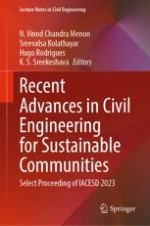2024 | OriginalPaper | Buchkapitel
Prognosis of Concrete Strength: The State of Art in Using Different Machine Learning Algorithms
verfasst von : Gaurav Basnet, Aashish Lamichhane, Amrit Panta, Sanjog Chhetri Sapkota, Nishant Kumar
Erschienen in: Recent Advances in Civil Engineering for Sustainable Communities
Verlag: Springer Nature Singapore
Aktivieren Sie unsere intelligente Suche, um passende Fachinhalte oder Patente zu finden.
Wählen Sie Textabschnitte aus um mit Künstlicher Intelligenz passenden Patente zu finden. powered by
Markieren Sie Textabschnitte, um KI-gestützt weitere passende Inhalte zu finden. powered by
